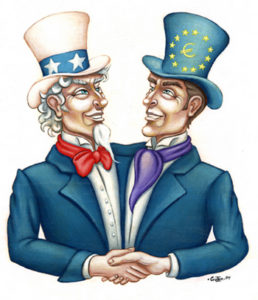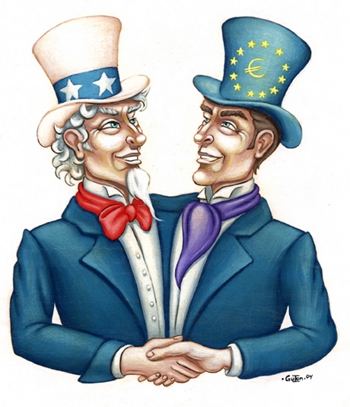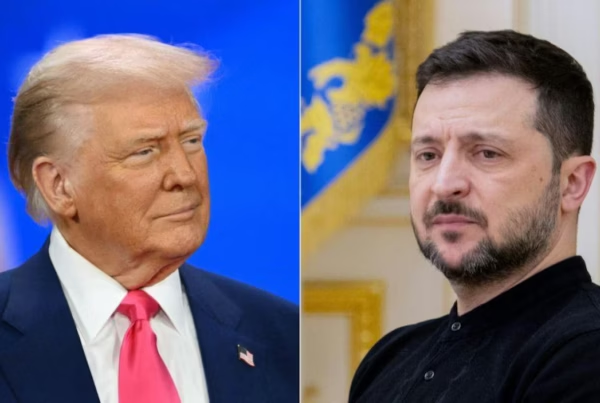By Louis Tapon

Image: Tamara Guion // Chief Executive Magazine
“Give a man the reputation as an early riser, and he can sleep till noon.” This remark attributed to Mark Twain goes a long way in explaining the Trump phenomenon in international relations. The bewilderment and consternation that followed his election have led many to affirm that the historic bonds between Europeans and Americans were all but over. Trump’s nativism, bombastic rhetoric and isolationist tendencies would translate into border walls, tariffs, migration quotas, and an end to multilateralism. One year into his presidency, this is not the case. Trump and his administration have taken little to no action that would lastingly shatter the bureaucratic, structural and cultural links between the European Union and the United States. Trump’s speech at the 2017 Davos conference, which many saw as a step away from his usual line on foreign affairs, is as meaningless as his constant flow of Fox News-induced tweets criticising the Mayor of London or the Belgian Prime Minister. The EU and the United States had, before Trump got elected, and will continue to have, after his inevitable downfall, shared values, interests, and identities, which will ensure strong and warm relations.
Before the election of Trump, those who predicted a drift between the United States and the EU pointed out President Obama’s Pivot to Asia for proof of a shift in America’s interest away from the Old Continent. Militarily, the Pivot meant the relocation from Europe of 2500 troops to Australia. Economically, the Obama administration had entered into the negotiation of the Trans-Pacific Partnership with 12 countries of East Asia. The deal was meant to re-establish American geostrategic dominance in the region, and temper the aspiration of a rising China. Together with the instability regarding the survival of the euro and the indecisiveness of European member-states as to the future nature of the Union, American policy-makers in the late 2000s had, it seemed, lost interest in Europe. As for Europeans, and notwithstanding a much-publicized ‘Obamamania’, the discovery that the U.S. intelligence community had for years spied on European leaders raise doubts as to America’s true motivations. Convincing though they may seem, these examples mask the historically unprecedented closeness of EU-U.S. relations. Economically, trade, particularly in the service industry, between the two blocks represents a staggering 40% of global trade. By comparison, the EU-Asia and the U.S.-Asia exports are thrice and twice as small respectively. Although on the decline as of late, the two economies still account for 48% of the world economy. Most convincingly, the economic value of all U.S.-European trade and investment generates 5 trillion dollars of sales each year and guarantees the livelihood of up to 15 million people. Such an interdependence cannot be reversed by one administration, however radical and committed to isolationism it may be. Such an interdependence also means that, when an economic crisis hits, leaders on both sides of the Atlantic will seek to solve it together. While it is true that the U.S. and EU member-states have not implemented the same fiscal policies after the 2008 crash, the Federal Reserve and the European Central Bank have, however, collaborated and implemented the same monetary policies, albeit with a small time lag. There are indeed doubts as to the future of the Transatlantic Trade and Investment Partnership (TTIP) that was instigated by the Obama administration – trumping the thesis that his administration was ushering a drift with the EU. While Trump has repeatedly voiced his opposition to the deal, his tendency to change his mind about practically anything as long as he personally gains from it, ought to bring optimism to the true atlanticists. And the announcement that the NAFTA trade talks, which were supposed to end last year, might continue into 2019 tends to make one think that TTIP might not be entirely off the table.
Militarily, the end of the Soviet Union was thought to bring about the end of NATO. After all, the enemy had been defeated and so the Alliance’s objectives going into the future were less clear. NATO’s intervention in Bosnia in the late 1990s and the integration of new members from the former Soviet bloc proves the continued relevance of the organisation. The possible creation of an integrated European army, which some see as a threat to NATO, has always been framed by European policy-makers as the next step of security cooperation between the member-states and the United States, and certainly not as a means to replace the Atlantic Alliance. Again on this question, Trump seems to have shifted his stance, from criticizing NATO and casting doubts concerning his commitment to Article 5, he now professes a more classic American position by asking Europeans for more defence spending. Such a shift is yet another example of the profound interdependence between the US and the EU.
The shared values and interests between the EU and the United States have ensured strong ties between the two powers. The attacks on American democratic institutions by the Trump administration is anything but new. The U.S. constitution and congressional checks and balances have proved their resilience with Nixon and they will do so again with Trump. Democratic values have and will continue to be of paramount importance for EU-U.S. relations. In 2003, at the height of the anti-Iraq War campaign in Europe, analysts predicted that President Bush had struck the final blow to the transatlantic relations. Five years later, the election of the first black president was seen as ushering a new dawn for EU-U.S. relations. One’s perception of reality is always contingent on day-to-day news and events. What remains true is the strong and historically unprecedented bond between the European Union and the United States. And this will remain the case in the foreseeable future.
Other posts that may interest you:
- The Trouble with ‘Ecocide’
- Carbon dioxide removal – hit or miss?
- Local Victories for Turkish Opposition — A Sign of Hope?
- Are France and Japan a Mismatch Made in Heaven?
- A Reflection on Dark Tourism
Discover more from The Sundial Press
Subscribe to get the latest posts sent to your email.





